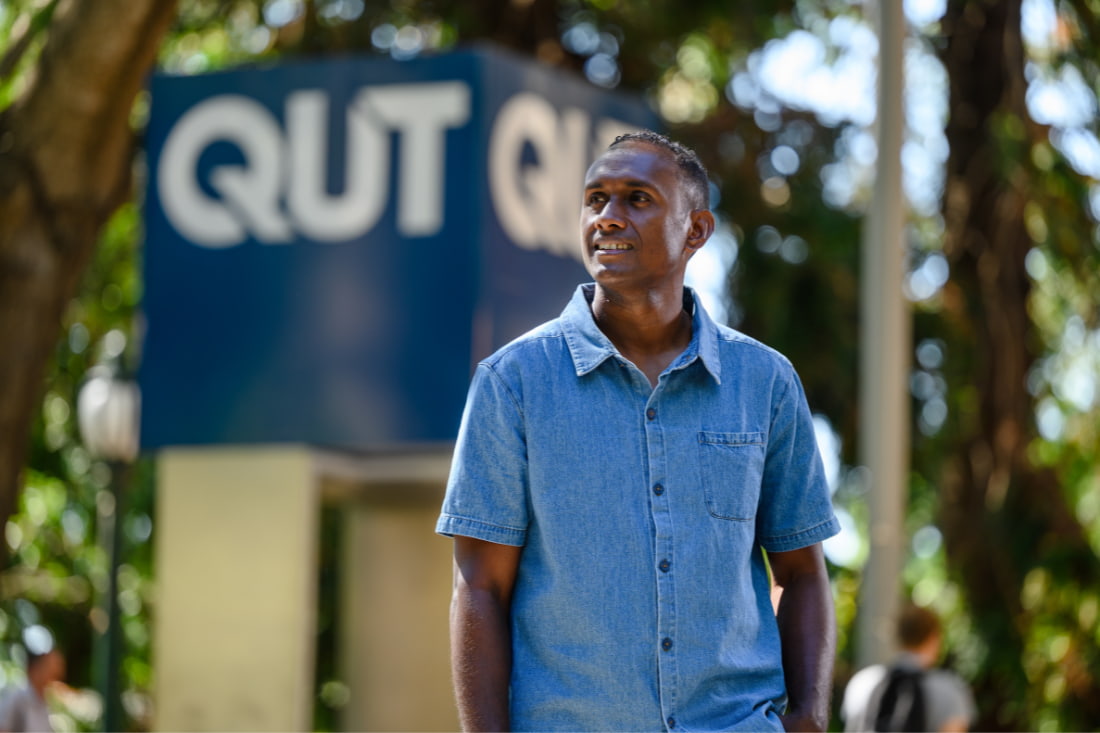Follow your interests
Through networking within the QUT justice community, I connected with mentors who told me about the Australian Federal Police and helped me with the application process. I now work within the Criminal Assets Confiscation Taskforce where I identify proceeds of crime and restrain assets purchased with those proceeds. Often the proceeds are from criminal activities such as drug importation, fraud and money laundering.
Gain a unique perspective
I really enjoyed the socio-legal perspective of the justice degree as it enabled me to critically think about the wider social implications of the law. The practical aspect of the course has also been really beneficial. This includes participating in the Vacation Research Experience Scheme, undertaking a professional placement with organisations like Cherbourg Aboriginal Shire Council, attending national conferences and undertaking international experiences.
Graduate with experience
'On one of my practical placements I explored the program delivery aspect of Queensland Corrective Services. I participated in and shadowed the programs for convicted sexual offenders and drug offenders reintegrating into society through more prosocial avenues. I gained employment with Queensland Corrective Services in the first semester of my final year of study, giving me eight months of experience before I graduated.'
Gain experience and connections
'As part of my justice course I completed a placement at the fraud integrity unit at Suncorp. I put the skills I had learnt during my course into a corporate environment and got to network and make meaningful connections. Doing this placement has given me a better understanding of financial crime and opened up a pathway to my current position.'
Double your opportunities
'I decided to pursue a double degree in law and justice, majoring in politics and policy, because I'm genuinely interested in understanding how laws operate, both in Australia and around the world. My studies excite me as they allow me to focus on critical issues like the environment and ensuring fairness for everyone. This double degree isn't just about acquiring facts; it's about my strong desire to leverage law and politics for positive change.'
Bachelor of Justice / Bachelor of Laws (Honours)
Electives to suit your interests
'The justice course allows students to choose elective study units based on their academic interests. I appreciated this flexibility as it enabled me to select units directly relevant to my current work in policing and the broader justice sector in my home country, the Solomon Islands. The course's curriculum aligned seamlessly with my career goals in the justice industry. Throughout the program, lecturers and course coordinators not only emphasised the practical relevance of the content but also highlighted potential job opportunities, offering a clear pathway to fulfilling careers within the justice sector.'
Bachelor of Justice student
A day in the life
Meet D’Arcy, who shares a day in her life as a double degree justice and psychology student at QUT.
'Immerse yourself in university life and engage with as many activities as you can so it makes your time at university worthwhile.'
Gain experience and connections
'As part of my justice course I completed a placement at the fraud integrity unit at Suncorp. I put the skills I had learnt during my course into a corporate environment and got to network and make meaningful connections. Doing this placement has given me a better understanding of financial crime and opened up a pathway to my current position.'








Highlights
- Opens broad career opportunities in law enforcement, government and private sector intelligence, crime prevention agencies and in the social justice sector.
- Choice of two majors to specialise in: criminology and policing or policy and politics.
- Study fully online or on campus.
- Work placements options to gain real justice industry connections.
- Varied electives to suit your interests such as forensic criminology, gendered violence, organised crime or environmental justice and climate change.
Highlights
- Opens broad career opportunities in law enforcement, government and private sector intelligence, crime prevention agencies and in the social justice sector.
- Choice of two majors to specialise in criminology and policing or policy and politics.
- Study full-time on campus.
- Work placements options to gain real justice industry connections.
- Varied electives to suit your interests such as forensic criminology, gendered violence, organised crime or environmental justice and climate change.
Why choose this course?
This course is designed with the flexibility to suit your passion for justice by drawing upon a range of areas across criminology, policing, policy, governance, intelligence, sociology, law, psychology and ethics.
This allows you to take your degree in the direction of your interest while building a wider perspective on the justice sector. You will learn to solve challenges in new ways, and bring valuable new knowledge and ideas to employers.
With two majors to choose from you can take the path of your choice across:
- Criminology and policing major – this major will set you up you to become a specialist in the field of criminal justice, criminology and police investigations. You’ll learn from experts in the field about how homicide, organised crime, forensics science and the penal and punishment system works.
- Policy and politics major – this major will empower you to make change to the legal and justice systems and to support and help the vulnerable. You will explore the most recent theory and practice of social justice, and understand topics like the power of people and protest.
With a local and international focus this major is custom built to set you up for a career in national or international policy development, human rights, environmental awareness, diplomacy or health and support services.
Both majors give you the opportunity to study abroad and complete work placements to gain invaluable learning and experience to increase employment opportunities.
Real-world learning
You’ll be part of up-to-date, real-world teachings that reflect what is happening right now in the world of politics, criminal justice and criminal investigation. This includes learning from world-class experts in the field as well as working hands-on with industry partners to help solve actual real-world problems. Recent partners include Bravehearts, Suncorp Fraud & Intelligence and Queensland Police Service.
You will also receive employment advice, interviews skills, networking and guidance to develop your professional identify so you graduate job-ready.
If you already have a career, this course can help you progress through the ranks and accelerate you through the criminal justice system. You’ll be able to bring new knowledge and ideas to your employer by understanding the bigger picture and bring unique points of view.
Visit the student and graduate blog to find out more about what it’s like to study justice and where a QUT degree can take you.
Explore this course
In the first year you will study core units to explore a range of subjects that will help you make an informed decision about what to specialise in. Build a solid foundation and learn about the criminal justice system, forensic psychology, deviance and social justice, and justice research methods.
You will then begin to specialise in your chosen major with the ability to select from a wide range of justice optional units such as Crimes of Violence, Sex and Crimes, Forensic Criminology, Border Security, Preventing Gendered Violence, Drugs and Crime, Organised Crime, Environmental Justice and Climate Change and many more.
Later in your degree you have the opportunity to take on a work placement, embark on an international study tour, or embed yourself in an Indigenous justice-focused organisation.
In the course you can expect lively but respectful and interesting discussions with other students who are enthusiastic about social justice issues. You’ll foster close connections and be mentored by experts and industry leaders that are committed to help shape your career in the direction of your passion.
Flexible delivery
The Bachelor of Justice is offered on campus and externally, all the lectures are recorded and study materials available online so you can access resources at any time and fit study into your lifestyle.
Double degrees
Combine two bachelor degrees into a single course of study. A double degree allows you to specialise in two fields and pursue different interest areas, gaining a broader range of skills and knowledge, and giving you a competitive advantage and greater career flexibility.
Consider the following double degrees with a Bachelor of Justice:
Careers and outcomes
The Bachelor of Justice is a flexible degree that will open up extensive career opportunities across justice in society.
Criminology and Policing majors open careers opportunities in areas of specialised policing and crime investigation, intelligence, corrective services, domestic violence law, forensic science or psychology.
Policy and Politics majors open careers in policy making, not for profit work, social and health-based community services.
Possible careers
- Aid work manager
- Community corrections officer
- Community worker
- Corrective services officer
- Criminal investigator
- Criminologist
- Customs officer
- Diplomat
- Disability services worker
- Family services officer
- Fraud and compliance investigator
- Information officer
- Ministerial policy adviser
- Police officer (federal/state)
- Policy officer
- Private investigator
- Youth worker
The Bachelor of Justice is made up of three parts:
- Core Units - 96 credit points (8 x 12 credit point core units)
- Study Area A (Major) - 96 credit points (8 x 12 credit point units). Choose between Criminology and Policing or Policy and Politics
- Complementary Studies - 96 credit points (8 x 12 credit point units)
Complimentary Studies can be made up of the following combinations:
- Study Area B (Justice or uni wide second major) - 72 credit points and 24 credit pionts of any Justice option units or university wide option units
- Combination of one minor (48 credit points) and 48 credit points of any Justice option units or university wide option units
- 2 university wide minors (48 credit points each)
- 96 credit points of any Justice option units or university wide option units
The Bachelor of Justice is made up of three parts:
- Core Units - 96 credit points (8 x 12 credit point core units)
- Study Area A (Major) - 96 credit points (8 x 12 credit point units). Choose between Criminology and Policing or Policy and Politics
- Complementary Studies - 96 credit points (8 x 12 credit point units).
Complimentary Studies can be made up of the following combinations:
- Study Area B (Justice or uni wide second major) - 72 credit points and 24 credit pionts of any Justice option units or university wide option units
- Combination of one minor (48 credit points) and 48 credit points of any Justice option units or university wide option units
- 2 university wide minors (48 credit points each)
- 96 credit points of any Justice option units or university wide option units
- ATAR/selection rank threshold
- 70.00
These thresholds are the lowest adjusted scores to which QUT made an offer in Semester 1, 2024.
Don't have a ATAR/selection rank?
- Course code
- JS34
- QTAC code
- 417301
- CRICOS code
- 006117E
-
- Online
- Kelvin Grove
-
- Kelvin Grove
- 3 years full-time
- 6 years part-time
- 3 years full-time
- February and July
- February and July
Assumed knowledge
Before you start this course, we assume you have sound knowledge of the subject/s listed below. If you don't have the subject knowledge, you can still apply for the course but we strongly encourage you to undertake bridging studies to gain the knowledge:
- English, or Literature, or English and Literature Extension, or English as an Additional Language (Units 3 & 4, C)
Year 12 early offer scheme
If you’re a current Queensland Year 12 student, you may be eligible to receive an offer for this course on the last day of Queensland Year 12, before receiving your ATAR or selection rank.
Offer guarantee
If you achieve an ATAR or selection rank of 70.00 or higher (including any adjustments) and satisfy all other admission requirements, you are guaranteed an offer for this course.
Advanced standing
If you have prior studies or work experience, you may be eligible for advanced standing (credit). You can apply for advanced standing once you've been accepted to QUT. If you're in your first semester of study, you must apply for advanced standing within 10 days of receiving your offer.
Deferment
You can defer your offer and postpone the start of your course for one year.
More about deferring your offer
Adjustments to your ATAR/selection rank
Any adjustments you receive to your ATAR or selection rank will be applied to this course.
Find out if you’re eligible for an adjustment to your ATAR or selection rank
Offers we made to school leavers in Semester 1, 2023
The figures listed in the tables below reflect the offers that were made to recent ATAR students. The entry thresholds box at the top of this page shows the lowest adjusted ATAR/selection rank required to receive an offer for all applicants for the most recent January QTAC offer round.
| Excluding adjustments | Including adjustments | |
|---|---|---|
| Highest ATAR/selection rank to receive an offer |
Selection rank
89.75
|
Selection rank
91.25
|
| Median ATAR/selection rank to receive an offer |
Selection rank
75.03
|
Selection rank
76.88
|
| Lowest ATAR/selection rank to receive an offer |
Selection rank
65.15
|
Selection rank
70.20
|
You can find out more about your fellow students’ backgrounds with this course’s student profile.
Other admission options
If you are of Aboriginal or Torres Strait Islander descent, you may be eligible for admission through our Centralised Assessment Selection Process (CASP).
Select the country where you completed your studies to see a guide to the grades you need to apply for this course.
If your country or qualification is not listed, you can still apply for this course and we will assess your eligibility.
I completed secondary school in Australia
- ATAR/selection rank
- 70.00
Offer guarantee
If you completed secondary school in Australia and achieve an ATAR/selection rank of 70.00 or higher (including any adjustments) and satisfy all other admission requirements, you are guaranteed an offer for this course.
Minimum English language requirements
Select the country where you completed your studies to see a guide on meeting QUT’s English language requirements.
Your scores and prior qualifications in English-speaking countries are considered. Approved English-speaking countries are Australia, Canada, England, Ireland, New Zealand, Scotland, United States of America and Wales.
If your country or qualification is not listed, you can still apply for this course and we will assess your eligibility.
We accept English language proficiency scores from the following tests. Tests must be taken no more than 2 years prior to the QUT course commencement.
| English Test | Overall | Listening | Reading | Writing | Speaking |
|---|---|---|---|---|---|
| PTE Academic/PTE Academic Online | 58 | 50 | 50 | 50 | 50 |
|
Cambridge English Score
You must share your results with QUT through the Candidate Results Online website. |
176 | 169 | 169 | 169 | 169 |
| IELTS Academic / IELTS Online / IELTS One Skills Retake | 6.5 | 6 | 6 | 6 | 6 |
| TOEFL iBT / Home / Paper | 79 | 16 | 16 | 21 | 18 |
Don't have the English language score you need? We can help!
We offer English language programs to improve your English and help you gain entry to this course.
When you apply for this course, we will recommend which English course you should enrol in.
Your actual fees may vary depending on which units you choose. We review fees annually, and they may be subject to increases.
2025 fees
2025: CSP fees available from September
2025 fees
2025: Available from July
2024 fees
2024: CSP $16,400 per year full-time (96 credit points)
2024 fees
2024: $33,600 per year full-time (96 credit points)
Student services and amenities fees
You may need to pay student services and amenities (SA) fees as part of your course costs.
HECS-HELP: loans to help you pay for your course fees
You may not have to pay anything upfront if you're eligible for a HECS-HELP loan.
You can apply for scholarships to help you with study and living costs.
QUT Excellence Scholarship (Academic)
QUT's premier offering for students with outstanding academic achievement.
- Scholarship eligibility
- Academic performance
Dr Cherrell Hirst AO Learning Potential Fund Scholarship
- Scholarship eligibility
- Struggling financially; Women
QUT Real World International Scholarship
A scholarship to cover tuition fees, with eligibility based on your prior academic achievements.
- Scholarship eligibility
- Academic performance
Keep up to date
QUT courses for you
Like to save your courses?
Please enter your first name and email so we can save your courses for you



